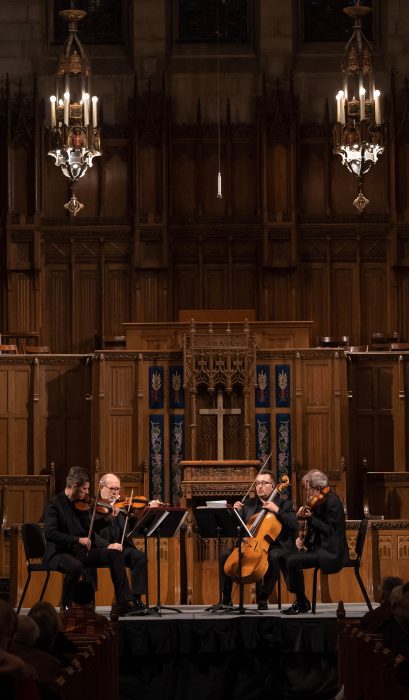Silesian Quartet opens Polish music festival with world-class artistry

For a metropolitan area with such a large Polish population, that nation’s music is surprisingly underrepresented on Chicago’s concert scene. Chopin is, of course, perennial and once in a great while other composers are programmed. But there is a vast treasure trove of Polish music worthy of exploration across all genres that goes almost entirely unheard.
All credit then to the Chicago Philharmonic for its “Poland 2018” festival, which opened Wednesday night and runs through Sunday, November 11 (Poland’s National Independence Day). The project is part of the Philharmonic’s ongoing collaboration with Polish artists and entities—a Philharmonic chamber orchestra visited Krakow this past spring—and this week’s festival is the ambitious local result of that partnership.
With a raft of Polish and American sponsors and financial contributors listed in the program, it’s too bad that there was such a relatively sparse turnout for Wednesday’s concert at Fourth Presbyterian Church.
Yet the program of Polish works performed by the Silesian Quartet was inspirational on every level. Though relatively short in duration—less than 90 minutes not counting intermission—the four string quartets offered a tantalizing sampler of the riches of Polish chamber music over eight decades—bracing, stylistically varied and distinctive.
Music of Karol Szymanowski led off the evening with his String Quartet No. 2.
Written in 1927, Szymanowski’s final quartet is characteristic of his orchestral works, with a sensual Scriabin-like impressionism and otherworldly mystery. The composer drew on themes from folk music of the Tatra Mountains in this work, reflected in the scurrying string figures and bursts of jagged energy.
The Silesian Quartet’s magisterial playing encompassed all of these variegated elements—the stomping dance rhythms, plaintive searching fragments and Bartokian harmonic dissonance. The Polish musicians displayed airtight technical security, sweetly burnished string tone and hair-trigger intensity—qualities they brought to every work on the program.
A child prodigy and noted violinist, Grażyna Bacewicz (1909-69) was remarkably prolific. Her vast output encompasses four symphonies, seven violin concertos, two cello concertos, one concerto each for viola and piano, and a dizzying amount of chamber music, including four violin sonatas and seven string quartets.
Bacewicz was represented with her String Quartet No. 4, from 1951. The Silesian Quartet has recorded all of Bacewicz’s quartets for Chandos. Indeed, they seemed so completely at ease and relaxed in her music, they seemed to he calmly presenting it to the audience rather than performing or interpreting it.
Bacewicz’s music is imbued with a reflective melancholy that fitfully builds into soaring romantic lines. The musicians also firmly put across the pages of restless agitation. Yet they were most sympathetic in bringing out the dark-hued yearning and elegiac sadness, especially first violinist Szymon Krzeszowiec and violist Lukasz Syrnicki.
Henryk Górecki (1933-2010) became an international rock star among classical composers in the 1990s with the unlikely smash success of his tragic yet luminous Symphony No. 3 (“Symphony of Sorrowful Songs”).
Górecki’s Quartet No. 1 (“Already it is dusk”) inhabits some of the same terrain, centered on gloomy melancholy and highly contrasted material. Written in 1988, the quartet is cast in a single movement, alternating a gently, seesawing melody with crashing fortissimo chords. There is an episode of folkish open fifths (also mined from the Tatra region) and the emphatic rhythms build into a manic dance, before the religioso opening music returns, ending the quartet in uneasy solace. Here too, the musicians brought a wide array of refined dynamics and scrupulous dedication, playing with utmost sensitivity.
It was a testament to the Silesian Quartet’s artistic integrity that they ended the evening (maintaining chronological order) with the most uncompromising work of the night, Krzysztof Penderecki’s Quartet No. 3.
As indicated by its title, “Leaves of an Unwritten Diary,” there is a sense of musical biography in this single-movement work from 2008. The musicians unerringly charted the shifting (yet artfully unified) disparate elements. A tonality-skirting viola solo is taken up by the other players, building with increasing urgency. Penderecki’s later Neo-Romanticism is manifested in an aria-like violin solo, yet there is also a density of textures and driving, unhinged quality to this nervy score. Individually and as a unit, the musicians brought lyric eloquence and knife-edged intensity to Penderceki’s music.
Now in its fourth decade, the Silesian Quartet is clearly a world-class chamber group and hearing these performances, it’s hard to fathom why this ensemble is not more celebrated or internationally renown. (Their performances also benefited from the clarity, bloom and glowing sound of the church’s main sanctuary, a vastly superior acoustic to the Buchanan Chapel upstairs.)
Hopefully, some smart Chicago organization will invite the Silesian Quartet back to town soon. Regardless, one could hardly imagine a finer or more musically rewarding launch to the Chicago Philharmonic’s Polish festival.
“Poland 2018” continues with organist Andrzej Bialko performing at St. John Cantius Church 7:30 p.m. Thursday. Jazz pianist Piotr Orzechowski performs 8 pm. Friday at the Polish Museum of America. On Saturday the Chicago Philharmonic performs music of Chopin, Szymanowski, Panufnik and Paderewski 7:30 p.m. at the Copernicus Center. And at 1:30 p.m. Sunday the Chicago Philharmonic performs a “Concert for Peace” with music of Penderecki and Kilar. chicagophilharmonic.org.
Posted in Performances




